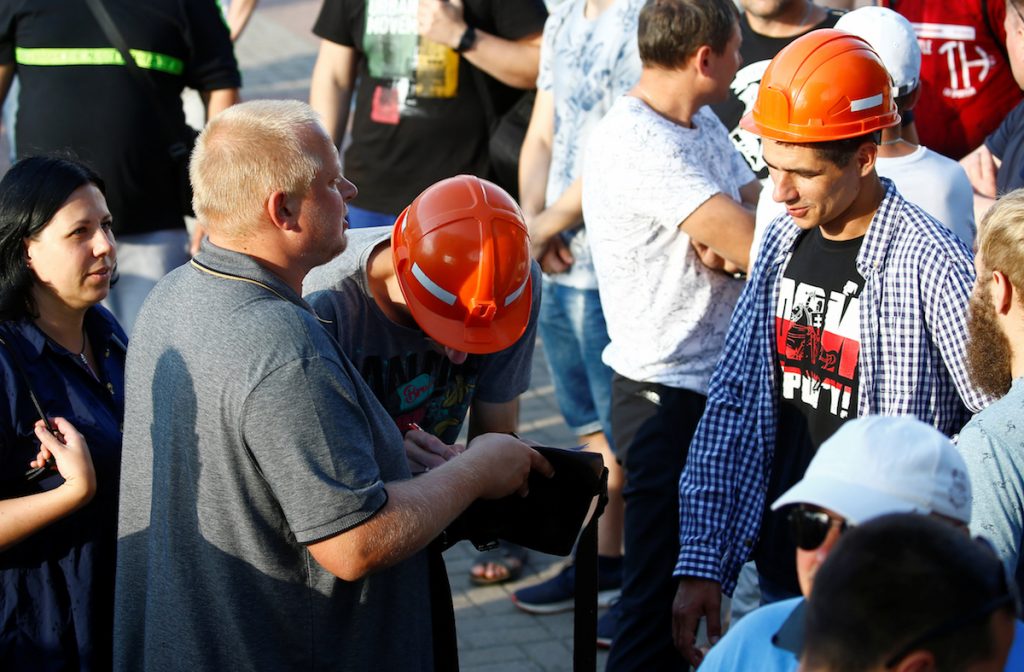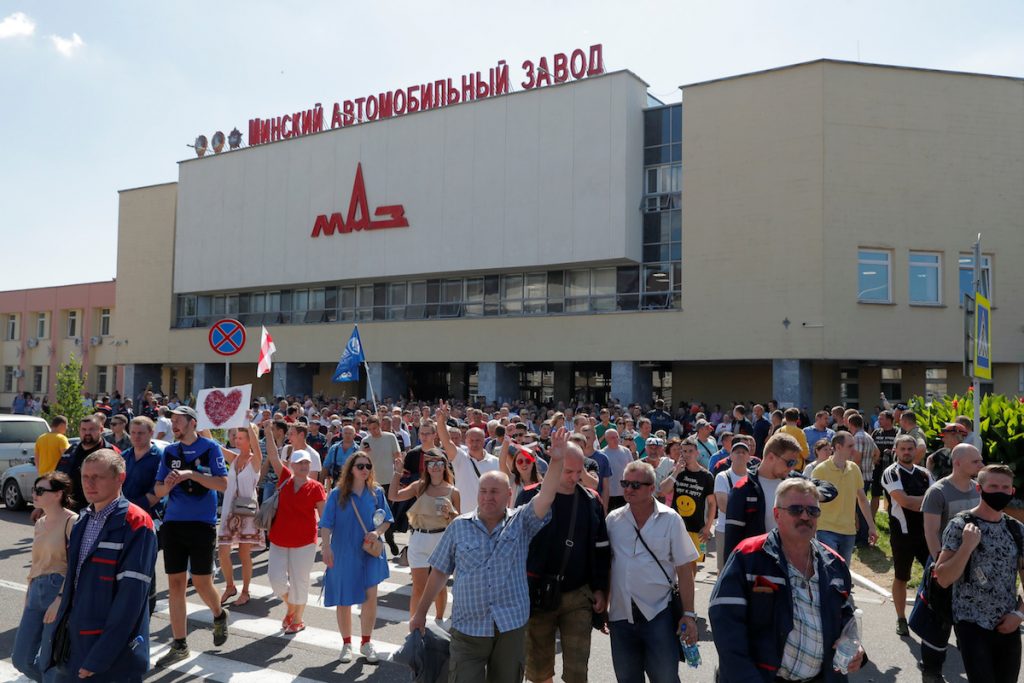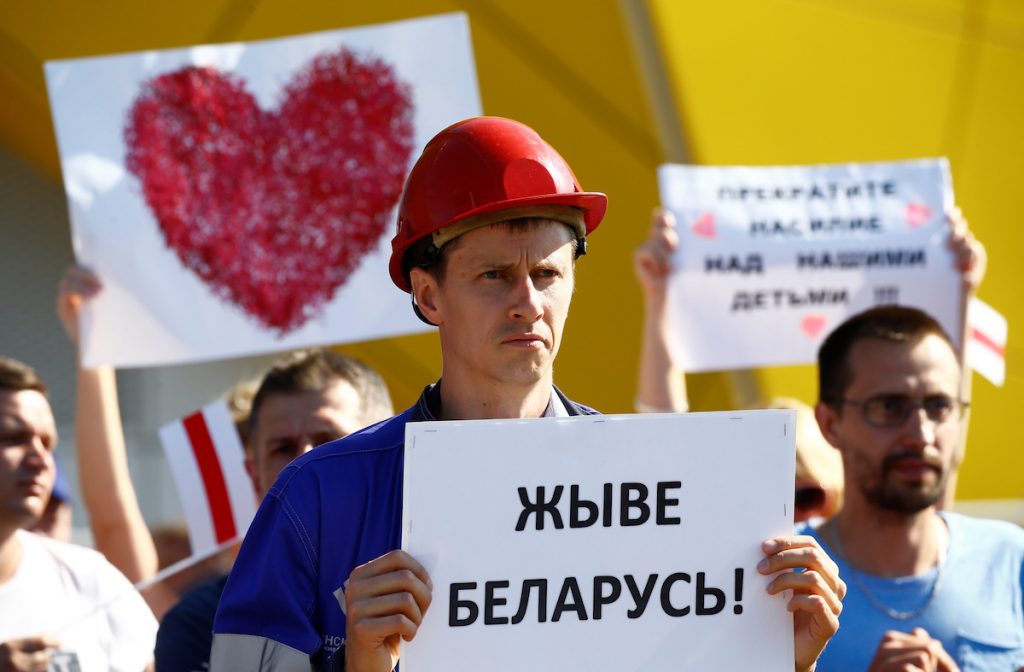Strikes, support from Europe and the threat of Russian intervention: the situation in Belarus
Protests continue in Belarus, as people take to the streets and the largest enterprises halt operations due to massive strikes.
Protesters demand President Alexander Lukashenka leave office, and have even voiced these demands during his public addresses.
However, he declares that he is not going to leave and is turning to Russia for help. Will Russia help Lukashenka hold on to power? Russian observers believe there is no reason for Russia to interfere.
The opposition’s position
Per the instruction of Svetlana Tsikhanouskaya, who declared herself the winner of the presidential elections on August 9 in Belarus, a Coordination Council has been created, the purpose of which is to negotiate with the authorities on the transfer of power.
It is comprised of 15 people: in addition to representatives from Tsikhanouskaya’s headquarters, these are well-known scientists and human rights activists, as well as the Nobel laureate in literature Svetlana Aleksievich.
• Belarus protests fueled by Telegram channel Nexta – what is it, how does it work?
• Belarus: 7th day of protests. Hundreds of thousands of people outside, Lukashenka refuses to leave
• Belarus: horrific evidence of torture and beating of protesters, general strike begins
Euroradio reports that Belarus has already begun to establish the “National Strike Committee”, the body that will manage the national strike. The chairman of the Belarusian Congress of Democratic Trade Unions Alexander Yaroshuk says that in the next two or three days, on behalf of the “strike committee”, a direct dialogue will be opened with officials on the peaceful transfer of power in the country.

Large enterprises are on strike all over the country. On August 17, workers from Uralkali, the main supplier of foreign currency to the Belarusian budget, joined the nationwide strike.
Many who support the workers on strike are gathering at the Minsk Automobile Plant. People are bringing food to the workers.:
On August 17, Svetlana Tsikhanouskaya recorded a new video message from Lithuania, in which she thanked the protesters for their courage and declared that she is ready to become a national leader.
The demands of Tsikhanouskaya and her supporters remain unchanged:
— Immediate release of all political prisoners
— Lukashenka’s resignation
— New, fair, and internationally supervised elections
Another thousands-strong march took place on the evening of August 17, when people gathered at Independence Square and marched to the prison, where those detained during the protests are still being held.
On August 18, the protesters gathered again in the Minsk city center to demand that Alexander Lukashenka leave.

How the authorities are reacting
However, as Lukashenka himself stated unambiguously on August 17, he is not going to leave. He flew by helicopter to the largest plant in Minsk – the Minsk Wheel Tractor Plant, where workers also went on strike.
He was met with shouts of “Go away!” and “Shoot yourself!”
“There will be no new elections. You’ll have to kill me first”, said Lukashenka.
The encounter nearly ended in a fight between Lukashenka and the workers.
State TV channels began to broadcast reports on the protests. This happened because journalists themselves started to join the protesters.
The General Prosecutor’s Office of Belarus announced that 600 people reported that they had been tortured and beaten in prisons, police vehicles and police stations.
As of the evening of August 18, 67 detainees remain in solitary confinement, and more than 50 of those reported missing have not yet been found.
Not a single criminal case has been opened regarding violence against peaceful demonstrators.
The combat units of the Belarusian army on the western borders are on full alert. This statement was made by Alexander Lukashenka on August 18 during a meeting of the Security Council.

How the world is responding
European Parliament MPs demand that Lukashenka be recognized as persona non grata on the territory of the European Union.
The German finance minister called on Lukashenka to be held accountable for committing terror against his own people.
On August 17, Polish Prime Minister Mateusz Morawiecki spoke with Tsikhanouskaya about the situation in the country and the need to release all political prisoners and repressed people. He said that Poland has allocated more than 11,000,000 euros to support the repressed NGOs and free media in Belarus.
The Seimas of Lithuania adopted a statement urging people not to recognize the results of the presidential elections in Belarus and to impose sanctions against its state apparatus.
An extraordinary summit of the European Union will be held via video conference on August 19, and will be dedicated to discussing the events in Belarus.
What will Russia do?
Russia’s position is of the greatest interest. Formally, it is still neutral, although Vladimir Putin congratulated Lukashenka on his victory in the elections.
Several media sources reported that two formations carrying military equipment were moving from Moscow and St. Petersburg towards the Belarusian border.
Novaya Gazeta also published an op-ed from the deputy editor-in-chief Andrey Lipsky titled: “Lukashenka wants to involve Russia. Do we need this?”
“Everyone is in hysterics, while Lukashenka…works on his main goal: using the internal political conflict provoked by the flagrant and selective abuse of the citizens of the country and subsequent brutal punitive actions against many thousands of protesters, in order to justify involving Moscow and Putin personally…”
“But is the Kremlin willing to pay any cost for Lukashenka? The Russian authorities, of course, have serious military-strategic interests in Belarus”, Lipsky writes. “However, are there any real aggressive threats coming from the outside, and do influential political forces in Belarus have the political will to start drawing closer to NATO to the detriment of Russian military-strategic interests? At this stage, the answer is an unequivocal ‘no’”.
The author believes that the Kremlin currently lacks the means to intervene by force, because as a result, “a country with completely friendly relations with Russia will inevitably turn into an enemy of the Russian people”. And Russia could “finally bury any intent of normalizing, at least to some extent, relations with Western countries”.
“And incidentally, who said that the key military-political interests of Russia (whether they like them or not) can be guaranteed only by a dictator who has completely lost the support, respect and trust of his people?” asks Lipsky.



















